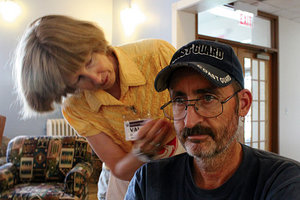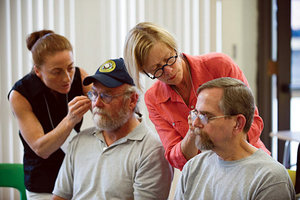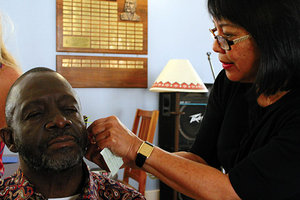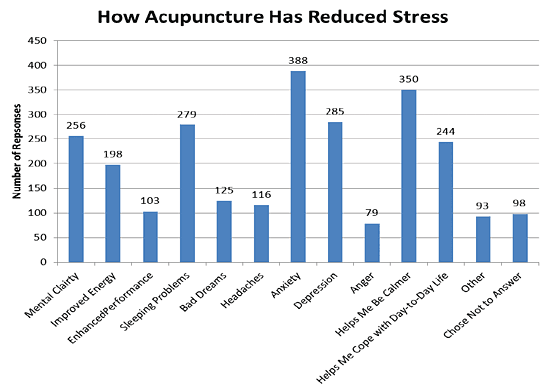After a deployment, the effects of war leave its marks on veterans in more ways than one. One of the most prevalent is PTSD (post traumatic stress disorder) which causes havoc on the nervous system leading to numerous health issues from depression to severe anxiety.
These days, acupuncture is taking center stage when it comes to finding a form of relief for active duty personnel, veterans, and their families. From Maine to Hawaii and from Seattle to Miami, the Acupuncturists Without Borders (AWB) organization has been offering effective treatment to help heal the wounds of war in community acupuncture clinics supported by through the Military Stress Recovery Project (MSRP).
The Program
AWB was organized during the aftermath of Hurricanes Katrina and Rita in September 2005 to provide free community acupuncture to the people of Louisiana. Based on this experience, Diana Fried, Executive Director and Founder of AWB, wanted to bring the same service to military personnel who were returning to the U.S. with horrific war wounds, including invisible ones like PTSD.
Fried believed this type of service was going to be critical for helping heal those who had been at war, and to help all of our communities heal from the impact of war. Thus, the Military Stress Recovery Project (MSRP) was born. The goal of the MSRP is to provide free community style acupuncture treatments to veterans, active duty soldiers and their family members to reduce the ravaging effects of PTSD and chronic pain sustained during their military service in our nation's wars.
 Veteran receiving ear acupuncture for stress.
Veteran receiving ear acupuncture for stress.
Albuquerque Veterans Clinic. Photo by Diana Fried.
"Years ago I felt that the impact we would start to see - in individuals who had been to the wars in Iraq and Afghanistan, their families, and in all of our communities - was going to be utterly devastating with regard to emotional trauma. As acupuncturists we hold simple, inexpensive tools in our hands that can bring tremendous peace to those who have been so devastated," said Fried. "With these tools I knew we could not only help heal the individuals treated, but also help prevent some of the tragic effects of PTSD, which often lead to domestic violence, substance abuse, suicide, homicide, or some combination, and more. It is incredibly inspiring to me to see how many acupuncturists have taken the model and ran with it, creating successful clinics and finding their own lives transformed by this work, and to constantly hear so many amazing stories of healing from veterans of all ages, and their families."
The first MSRP clinic developed by AWB began as a pilot in Albuquerque in the fall of 2006. The Albuquerque Veterans Clinic is still going strong and treats up to two dozen veterans per week. In the six years since the creation of the pilot clinic, nearly 30 MSRP clinics have opened across the country. Dedicated acupuncturists desiring to open a clinic take an AWB training course, "Healing Community Trauma," wherein they learn how to establish and run a community acupuncture clinic. They then return to their local communities and build a clinic. Usually the space is donated and the acupuncturists and other staff volunteer. This creates a truly low-cost clinic that can offer free treatments.
MSRP clinics are community-style meaning that participants sit in chairs in a circle fully clothed. Five needles are placed in each ear according to the National Acupuncture De-tox Association (NADA) protocol, aka the Five Needle Protocol.
 Portland Veterans Acupuncture Clinic volunteers offer relief to two veterans. Portland, Maine. Photo by Jim Daniels.
Once the needles are inserted, the group rests for 30 to 45 minutes. It is during this resting time that tremendous healing takes place. The community-style acupuncture provides caring, compassionate treatment in a group setting and allows everyone treated to experience relief from stress and trauma together. When the entire group feels calm and quiet, hope, determination and resiliency rise powerfully and people can move forward to create a better life.
Portland Veterans Acupuncture Clinic volunteers offer relief to two veterans. Portland, Maine. Photo by Jim Daniels.
Once the needles are inserted, the group rests for 30 to 45 minutes. It is during this resting time that tremendous healing takes place. The community-style acupuncture provides caring, compassionate treatment in a group setting and allows everyone treated to experience relief from stress and trauma together. When the entire group feels calm and quiet, hope, determination and resiliency rise powerfully and people can move forward to create a better life.
"My health was terrible before I came to the clinic...I would say I was on the brink of death, taking dozens of medications, and had no hope. Now I am off all my meds, and I love life. It was the acupuncture that brought me back," said veteran and patient Dixon.
Others who have been taking psychiatric medications have also been able to wean off of them slowly due to the rapid results they have seen with acupuncture treatments.
"I am down to 6.25 mg of Seroquel, I am sleeping ok, and I am doing ok at work. I am able to go to the gym more often and work out and not get as tired. Acupuncture appears to be working great for me," said another veteran recently.
Using The NADA Protocol
One of the main reasons there has been high success rates in the program is in part due to the NADA protocol that continues to be used.
The protocol grew out of the work of Dr. Michael Smith at Lincoln Hospital in New York City in the late 1970s, which led to the formation of the National Acupuncture Detoxification Association (NADA) and the codification of the clinical protocol: Five needles inserted at specific points in the ear.
 Albuquerque Veterans Acupuncture Clinic.
Albuquerque Veterans Acupuncture Clinic.
Albuquerque, New Mexico. Photo by Diana Fried.
Research has shown that before individuals can overcome chemical addiction, attention must be given both to the alleviation of the diverse array of mental-physical stresses impacting their lives, as well as comprehensive restoration of the community infrastructure. Further research has demonstrated that the NADA protocol addresses both the addictive component and the stress component of drug dependency.
Recovery from chemical addiction mirrors the recovery path for individuals suffering from post-traumatic stress syndrome, which is why the NADA protocol is now being used to treat the effects of trauma. AWB volunteers witnessed this first hand while treating the Gulf Coast residents and responders after Hurricanes Katrina and Rita. The survivors and rescue workers faced enormous mental and physical stresses not only as individuals, but also in their families and communities amidst an almost unprecedented breakdown of social infrastructure.
Translating the Louisiana experience into the MSRP clinics has demonstrated that the NADA 5 Needle protocol is an effective tool for treating the stresses and wounds of war.
As a result of their treatments, clinic participants report stress reduction, improved mental clarity, improved energy, enhanced performance, better sleep, fewer bad dreams and headaches, less anxiety and depression, reduced anger and pain, improved general health, and better relationships.

Where Do We Go From Here?
AWB is currently pioneering two different types of MSRP clinics. One is a "mobile clinic" where an AWB volunteer acupuncturist goes to the Health and Wellness Center on Kirtland Air Force Base in Albuquerque twice a month. Participants come from all walks of life on the base�male, female, active duty, veterans, support personnel.
The clinic is truly a microcosm of the base population. AWB is using the same model in this clinic; community style, NADA 5 Needle protocol. AWB is extremely excited about this clinic on the base. It may be the only clinic of its type operating in the US. We are hoping that other acupuncturists will be inspired to contact a local base and set up an on-base MSRP clinic for military personnel in their communities.
AWB is also starting another pilot MSRP clinic that is solely for female participants�active duty, veterans and their female family members. The reasons behind a female-only clinic are many and complicated. First, a growing number of women are serving in the US military.
In 2008, 11% of veterans from the Afghanistan and Iraq military operations were women. These numbers are expected to keep rising. In fact, women are the fastest growing group of veterans. Next, according to the National Center for PTSD, almost 20% of the women veterans of the conflicts in Iraq and Afghanistan have been diagnosed with PTSD.
Finally, many women in the military experience Military Sexual Trauma (MST) which in itself causes PTSD.
"Studies of sexual assault among civilian populations identify posttraumatic stress disorder (PTSD) as a frequent outcome. Sexual assault victimization is associated with high lifetime rates of PTSD in both men (65%) and women (45.9%). Interestingly, these rates are higher than the rate reported by men following combat exposure (38.8%), according to the National Center for PTSD.
A growing number of female veterans experiencing higher rates of PTSD combined with feedback from the clinics that many women do not feel comfortable being treated in a mixed gender environment, led AWB to pilot a female-only clinic.
AWB is currently supporting 27 MSRP clinics across the country located in: California; Colorado; Washington, DC; Florida; Georgia; Idaho; Illinois; Massachusetts; Maryland; Maine; Minnesota; New Mexico; New York; Oregon; Pennsylvania; Texas; Virginia; Washington and Wisconsin. For more details about a specific clinic, please visit www.acuwithoutborders.org. If you are interested in volunteering in an existing clinic, starting a new clinic or getting involved with the Military Stress Recovery Project in some other way, please send an email to Terrie Duda Harris, DOM at or call 505.266.3878.
Terri Duda Harris is an acupuncturist from Santa Fe, NM. She is a 2002 graduate of Pacific College of Oriental Medicine--New York and a volunteer with AWB, Coordinating AWB's Military Stress Recovery Project.



